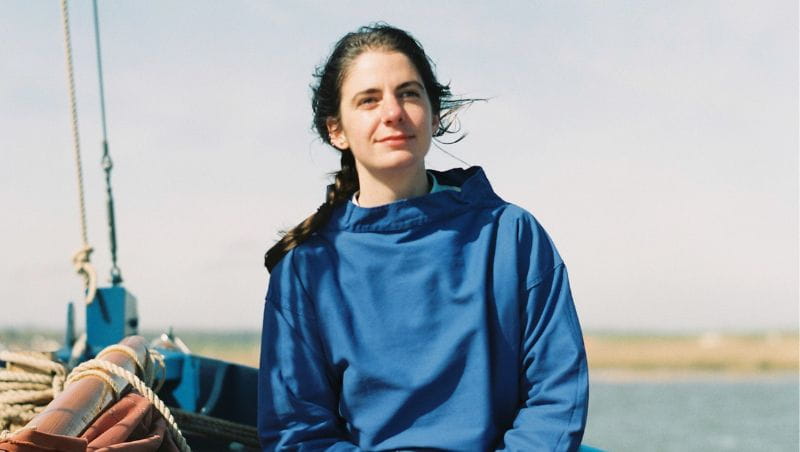Philosophy and sustainability student Rose Ravetz has spent a decade sailing around the world exploring far flung destinations and mastering the traditional art of engineless sailing along the way.
Her passion for the sea has inspired a new film about sailors who rely only on a diverse range of traditional skills and complete understanding of the environment the navigate rivers, coasts and open seas.
Ahead of the premiere of Wind, Tide & Oar at the National Maritime Museum, I asked Rose about the film, her sailing experiences, and what inspired her to study philosophy and sustainability.

What inspired the film?
"My brother, Huw, joined me on my 23’ boat for a week sailing around the Suffolk and Essex coast. Though my boat had an engine, I tried not to use it even in difficult or complex manoeuvres. Instead, I wanted to use the wind and tide and various traditional seafaring skills to persuade the boat to do what I needed her to do. My brother, who had never previously sailed, was taken by this commitment. Himself a filmmaker of tradition, analogue film being his medium, he could see the cinematic potential in this philosophy of 'engineless sailing'."
When, where and why did you first start sailing?
"When I was 19, I dreamed of travelling in South America. I was resistant to flying, however, as I wanted to experience our planet's wildness, and the emissions and disconnect of flying seemed to undermine this aspiration. An acquaintance told me about travellers who “hitchhike” across the Atlantic Ocean, volunteering on small sailing yachts. So, I walked around the marinas in the Canary Islands, asking if anyone needed crew. After a few days, I joined a 50ft yacht going to the Caribbean. That was my first real sailing experience."
What first inspired you to sail engineless?
"I learned to sail on boats that had engines. They seemed very important; the engine was used in any manoeuvre that would be difficult. I started to wonder how seafarers in the past managed without an engine. After some research and meeting some devoted sailors, I discovered that the ways and means of traditional sailing were numerous; sailors relied on rich and diverse skills and impressive proficiency in what they did. Originally, I wanted to learn these traditional skills so that I could be a better sailor. Eventually, it would be the philosophy of engineless sailing that held attraction."
What is special about engineless sailing?
"Many different forces are at play on a sailing vessel. Getting a boat to do what you want requires a lot of skill, and circumstances can limit what is possible. The modern convenience is to fire up the engine and produce a force that overpowers the natural elements. Something very unique occurs when this option is not available. The sailor must deepen into the intricacies of the environment, to use all their senses to feel the ever-changing variations in the natural world and these interactions with the boat. What follows is a conversation between the sailor, the boat, and nature. For the sailor to be successful in their endeavours, they must listen more than they speak; they cannot just impose their will. The engineless sailor can’t accurately predict or completely control what will happen. Instead, they rely on their skill and, more importantly, an intimate connection to their environment."
What do you want people to learn from the film?
"The exceptional situation of the engineless sailor, that of an intimacy with the world around them, can offer an interesting perspective on our relationship with nature. We live in a society where the anthropogenic voice is valued more than the natural world's. We are effectively attempting to force our ship into great headwinds, and a strong current, with the dominance of our roaring engine. The problem is that we are running out of fuel, whilst causing great strain on our ship. Not only that, but we often feel disconnected, untethered, and separated in the process. The engineless sailor’s success relies on allowing nature's voice to be heard. We would like to offer a perspective that differs from domination and control, and for the audience to think about their own relationship with nature."
What is special about sailing around the Essex coast?
"Mud! The Essex coast is wonderful for its muddy seabed, which sailors can use to their advantage. It was common for traditional Essex boats, such as Thames sailing barges and fishing Smacks, to purposefully sail into the mudbanks, coming to a stop before rowing lines ashore and pulling themselves to the wharf. There are also many little creeks and inlets for exploring, often in wild and beautiful areas. With so many interesting places to discover, sailing around the Essex coast never gets boring."
Where is your favourite place to sail and why?
"Despite my love of Essex mud, the most magical place I have sailed is in the Pacific Ocean. Many incredibly beautiful islands, like the Marquesas in French Polynesia, appear from the deep blue seemingly out of nowhere. These islands are abundant in flora, fauna, and indigenous culture. I also love long ocean crossings, and my favourite moments have occurred when furthest from land. Nothing compares to the huge, star-spangled sky, the full moon rising on the horizon, and nothing but waves and wind all around."
What inspired you to study philosophy and sustainability at Essex?
"After ten years at sea, I wanted to become more actively engaged in addressing the climate crisis. I had fallen in love with the wild places on our planet whilst also seeing the damage human activities were causing. The combination of philosophy and sustainability immediately struck me as my way forward. The climate crisis goes beyond science, economics, or politics, though it encompasses all these things; it is how we think and what we implicitly believe that fuels how we act. It isn’t until we question the philosophical foundations of our current situation that we can begin to repair it."
Read more about Wind, Tide & Oar.





